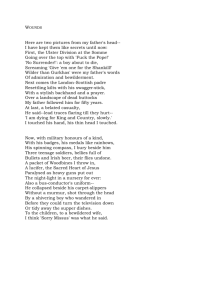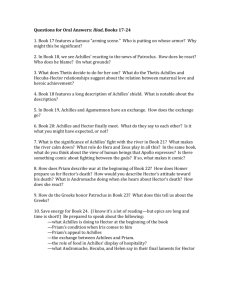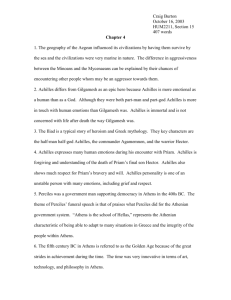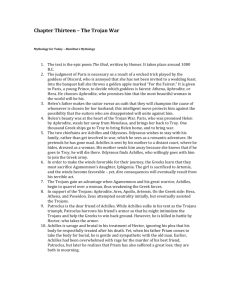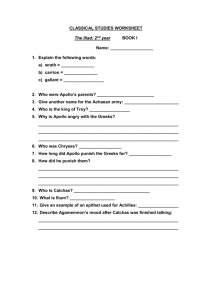File
advertisement
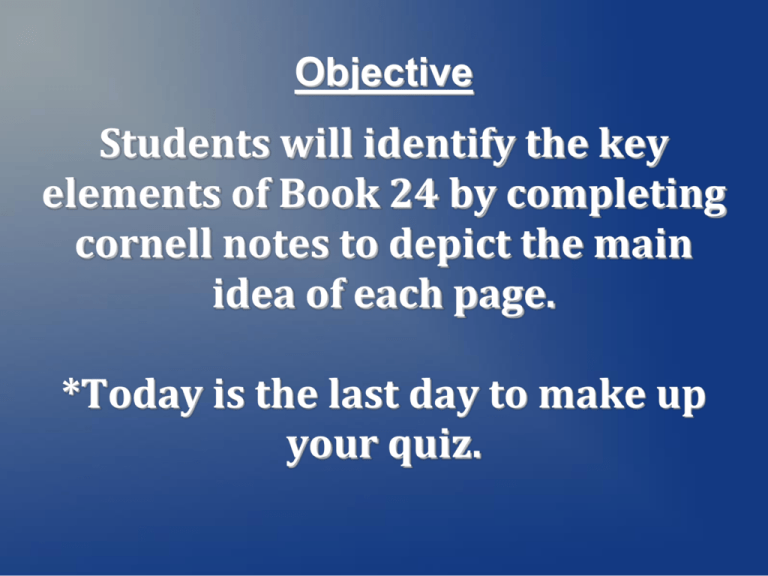
Objective Students will identify the key elements of Book 24 by completing cornell notes to depict the main idea of each page. *Today is the last day to make up your quiz. The Story of Achilles' Childhood Take the next 15 minutes to finish your creative writing story. When you are finished, you must peer edit one of your peers' papers and sign it, as well as have someone peer-edit your own and sign it. Look for capitalization errors, spelling errors, punctuation errors, and grammar errors. Circle the error and make corrections next to the mistake. Vocabulary While I check the first half of your story, write down the following definitions in the notes section of your binder/notebook. Direct Characterization tells the audience what the personality of the character is. Indirect Characterization shows things that reveal the personality of a character. There are five different methods of indirect characterization (speech, thoughts, effect on others, actions, looks). Book 24 Characterization Lines 12-16 of Book 24 “The memories flooded over him, live tears flowing, and now he’d lie on his side, no flat on his back, now facedown again. At last he’d leap to his feet, wander in anguish, aimless along the surf, and dawn on dawn flaming over the sea and shore would find him pacing.” Book 24 Characterization Lines 46-47 of Book 24 “But murderous Achilles – you gods, you choose to help Achilles.” Lines 28-31 of Book 24 “They kept on urging the sharp-eyed giantkiller Hermes to go and steal the body, a plan that pleased them all but not Hera, Poseidon, or the girl with blazing eyes. They clung to their deathless hate of sacred Troy. Homework For tonight and tomorrow night, your homework will be to finish reading Book 24 and complete the bubble map, writing the main idea of each page in the coordinating bubble. You will turn this in at the beginning of class on Wednesday. Groups Your group must have 4-6 people…. Meaning, no less than 4, and no more than 6 Objective Students will draw comparisons between the human condition of Achilles during the Trojan War and that of Vietnam soldiers suffering from PTSD by citing textual evidence from primary resources. Book 24 Cornell Notes *Continue to work on this, your completed Cornell Notes are due when you enter the door on Wednesday. Vocabulary (per. 2) Xenia - the ancient Greek concept of hospitality, the generosity and courtesy shown to those who are far from home Vocabulary (per. 2) What is one way you can show the concept of xenia to a guest of your home? Does Achilles show xenia towards Priam? Why or why not? Vocabulary (per. 4-7) Direct Characterization tells the audience what the personality of the character is. Indirect Characterization shows things that reveal the personality of a character. There are five different methods of indirect characterization (speech, thoughts, effect on others, actions, looks). Xenia - the ancient Greek concept of hospitality, the generosity and courtesy shown to those who are far from home Book 24 Characterization Lines 12-16 of Book 24 “The memories flooded over him, live tears flowing, and now he’d lie on his side, no flat on his back, now facedown again. At last he’d leap to his feet, wander in anguish, aimless along the surf, and dawn on dawn flaming over the sea and shore would find him pacing.” Book 24 Characterization Lines 46-47 of Book 24 “But murderous Achilles – you gods, you choose to help Achilles.” Lines 28-31 of Book 24 “They kept on urging the sharp-eyed giantkiller Hermes to go and steal the body, a plan that pleased them all but not Hera, Poseidon, or the girl with blazing eyes. They clung to their deathless hate of sacred Troy. Formative What god orders Hermes to guide Priam safely to Achilles? Is Hera on the side of the Greeks or Trojans? Who does Priam mention to Achilles to convince him for his son's body back? What god is arguing against Achilles because of the hubris Achilles is showing? Achilles in Vietnam In your group, you will want to delegate roles: -“The Reader” – will read the article aloud (larger groups can have 2 readers) -“Discussion Leader” – will initiate discuss, give real-life examples, ask questions, call on other members to share, etc. - “The Writer” – will listen to discuss and formulate a well thought out response to answer required questions (larger groups may have 2 writers) -“The Speaker” – will be in charge of presenting findings to the class, speaking clearly and making sure what is shared is classroom appropriate (smaller groups may have the speaker also be the discussion leader) *If you think of other roles, you may assign them to members accordingly
